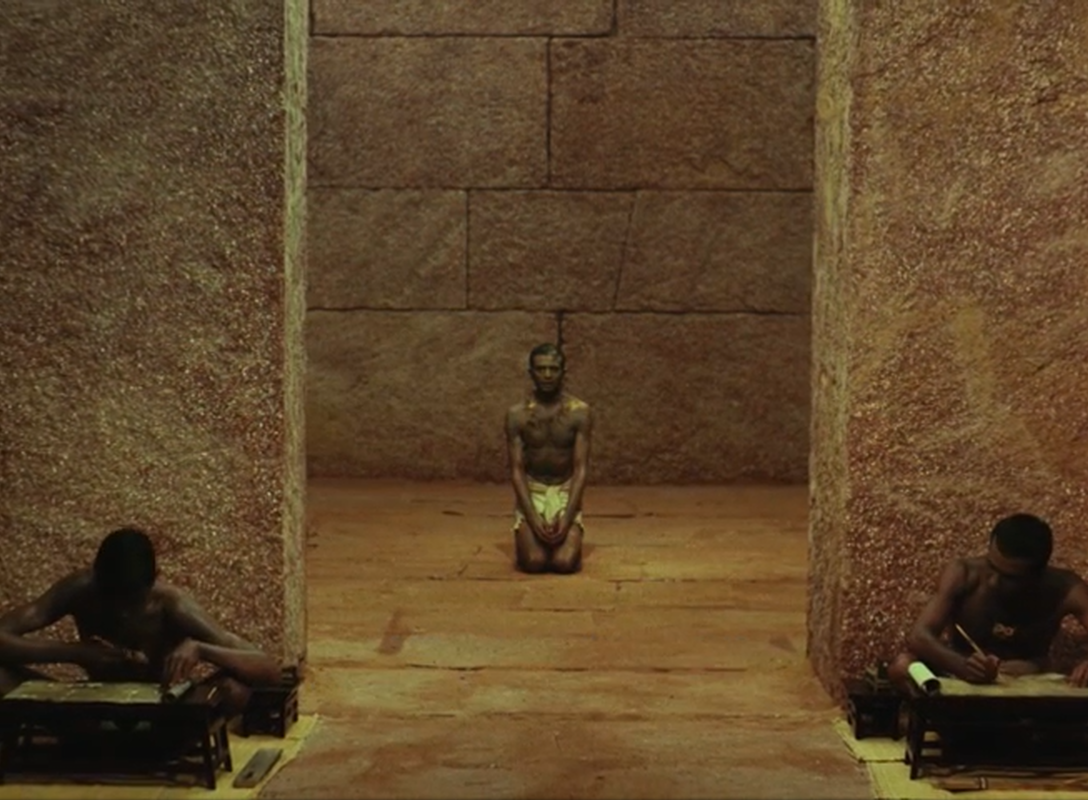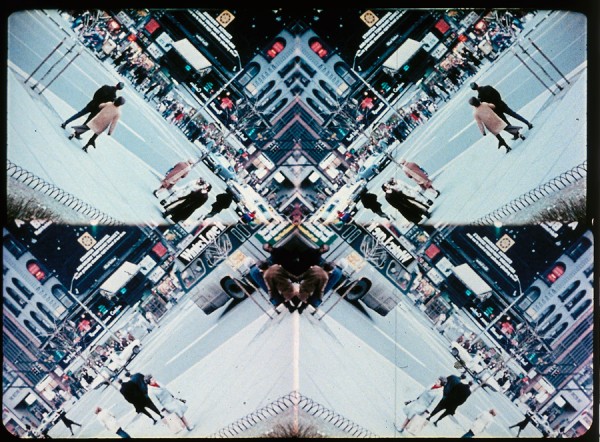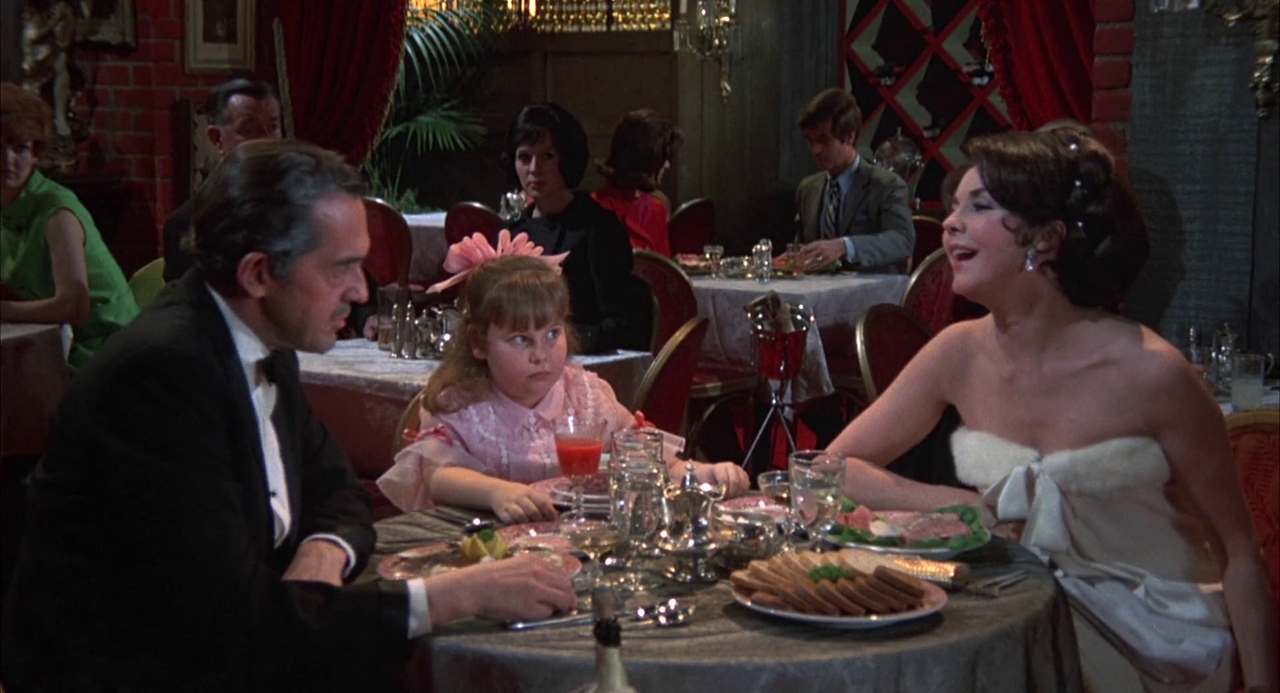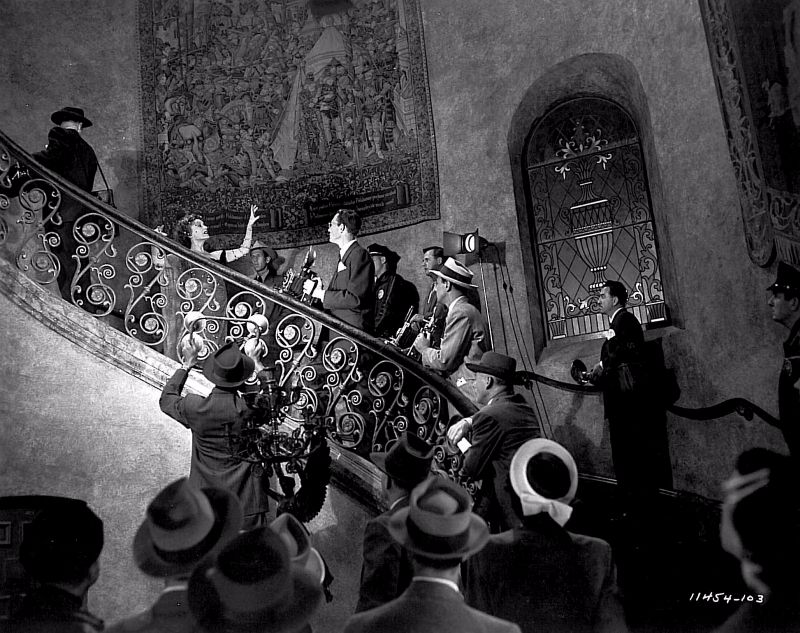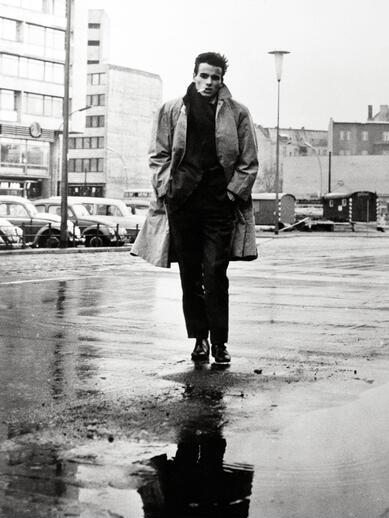viewColloque de chiens (1977)
Monique (Silke Humel, R) spending Christmas Eve in a bar, looking for a way out. She's speaking to an elderly man in an expensive tuxedo. Is this it? DP: Denis Lenoir; still photographer Patrice Morere.
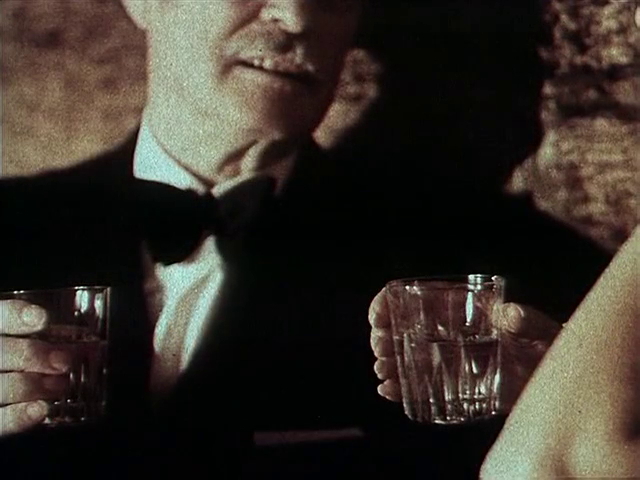
December 24: the night before Christmas (Christmas Eve)
Colloque de chiens (Raúl Ruiz, 1977)
“Nobody knows why Monique, the cold and dry voiced whore, bears in her eyes the sadness and tiredness of her past.”
Filmed during an actors' strike, Raúl Ruiz's Colloque de chiens consists for the most part of still photographs with mixed in stolen moving footage of unsuspecting bystanders and stray dogs. Told in fotonovela format, we follow the pitiful account of Monique, who as a young girl, learns that her mother is not who she thinks she is. Rejected, she throws herself into a life of vice until she meets Henri, a handsome young television repairman. Together they buy a small café, and are happy for once. But the cyclical nature of life determines her faith.
Raúl Ruiz's work is, like Henri's modus operandi, determined by maps and patterns. Even in the short comically melodramatic breathe of Colloque de chiens, the map has been laid out for Ruiz's later, much more complex narrative.
Colloque opens in a barren landscape. There are the skeletal towers of a nearby city, and the endless barks of abandoned dogs. Obscured by tall reeds, a blown-up photograph of a young man. The face, soft and familiar, a distant memory.
“He wanted to be returned to the world of his childhood and to this woman who was perhaps waiting for him” –Chris Marker, dialogue from La Jetée (1962)
Amongst bare winter bushes a large photo of a friendly, young, familiar looking man. In the background against a grey sky multiple white apartment buildings.

#Bales2023FilmChallenge #RaúlRuiz #SilkeHumel #EvaSimonet #RobertDarmel #JorgeArriagada #DenisLenoir #PatriceMorere #drama #crime #melodrama #ShortFilm #photography #animals #gender #prostitution #France #1970s ★★★★☆
#todo
view
شكاوى الفلاح الفصيح [El-Fallâh el-fasîh / The Eloquent Peasant] (Chadi Abdel Salam, 1970)
Dec
23
National Farmers Day – India
The peasant (Ahmed Marei) in a stone temple, flanked by scribes. DP: Mustafa Imam.
4000 years ago, Egypt, Middle Kingdom. A peasant, leading his mules past a stream of water, is tricked. With his animals gone, he pleads to the Pharaoh to restore Maʽat, harmony.
“He's a peasant. Without looking into his situation, words are all he has.”
Chadi Abdel Salam is not only this film's director, but also a trained architect, later set and costume designer. His eye wordlessly speaks the passing of time in the smallest of details. The withering of ferns, desert sand staining linen, the Sun merging with skin. At once, the universal presence of the gods becomes visible.
view
La baie des anges [Bay of Angels] (Jacques Demy, 1963)
Dec
23
pears
A blonde Moreau at a restaurant table with a man seen from the back. There are several semi-empty wine glasses and pears sliced lengthwise on a plate, covered with a napkin. Jeanne's character Jackie Demaistre is holding a small sheet of paper with a schematic drawing of a roulette wheel while throwing the man a sceptical glance. DP: Jean Rabier.
“We'll go back to Nice tomorrow. The Bay of Angels brings us luck.”
– Jean Fournier
view
Mahagonny [Number 18] (Harry Smith, 1980)
Dec
22
राष्ट्रिय गणित दिवस
A kaleidoscopic New York street scene. Mahagonny was “made to be displayed with four separate 16 mm projectors onto a single screen or onto two billiard tables suspended over a boxing ring” (Kevin Arrow, see link below).
Mahagonny is filmmaker, artist, musicologist, and alchemist Harry Smith's mathematical analysis of Marcel Duchamp's masterpiece La mariée mise à nu par ses célibataires, même [The Bride Stripped Bare by Her Bachelors, Even], aka Le Grand Verre [The Large Glass], which was completed in 1923. It is set to Brecht and Weill's opera Aufstieg und Fall der Stadt Mahagonny [Rise and Fall of the City of Mahagonny] from 1930, which was an opera Smith was obsessed with while living in New York's Chelsea Hotel.
“My cinematic excreta is of four varieties:–batiked abstractions made directly on film between 1939 and 1946; optically printed non-objective studies composed around 1950; semi-realistic animated collages made as part of my alchemical labors of 1957 to 1962; and chronologically superimposed photographs of actualities formed since the latter year. All these works have been organized in specific patterns derived from the interlocking beats of the respiration, the heart and the EEG Alpha component and they should be observed together in order, or not at all, for they are valuable works, works that will live forever—they made me gray.”
– Harry Smith, via
view
Angel, Angel, Down We Go [Cult of the Damned (Robert Thom, 1969)
Dec
22
A chubby, piggy pink-dressed debutante (Joan Calhoun) flanked by her uppity-class parents (Charles Aidman and Jennifer Jones) in a fancy restaurant. The kid gives her mother the side eye. Other eaters look on in shock. DP: John F. Warren.
“We say hip, hooray,
Hip, hip hooray,
For fat!”
– Barry Mann & Cynthia Weil, The Fat Song
view
Sunset Boulevard (Billy Wilder, 1950)
Dec
21
Short Girl Appreciation Day
Norma Desmond (Gloria Swanson) descending an ornate staircase. The size of the set gives you an approximate idea of her height. Even when several steps above him, Swanson's dwarfed by the photographer in the dark suit and glasses. DP: John F. Seitz.
The main character is a “short girl” [I do not agree with the infantilizing wording] on Short Girl Appreciation Day (USA)
“I am big. It's the pictures that got small.”
– Norma Desmond
Also starring, Buster Keaton, who was 5'5” / 1,65 m.
view
Nasser Asphalt [Wet Asphalt] (Frank Wisbar, 1958)
Dec
20
National Greg Day
“Sie können sich einen anderen Beruf aussuchen. Sie sind ein toter Mann.”
view
Si muero antes de despertar [If I Should Die Before I Wake] (Carlos Hugo Christensen, 1952)
Dec
19
National Hard Candy Day
Lucio (Néstor Zavarce) and his new friend sharing one of her fancy 10¢ lollipops. DP: Pablo Tabernero.
Lucio is the class clown, a ne'er-do-well relying on his police-dad's rank and classmates' homework. One of these classmates, a smart little girl, promises him fancy lollipops in exchange for protection. And she has a secret for him too, about the origin of the candy, and the nice man giving her those and other nice things. Under oath, she tells Lucio everything and then promptly disappears. With his friend gone, killed as he later finds out, and an oath weighing on his heart, what can Lucio do when another girl goes missing?
“Only a child can kill the monster.”
– narrator
Cornell Woolrich's haunting tales of childhood lost leaped from Ireland to Argentina. With some similarities with Fritz Lang's M (1931), this fairy-tale feels more oppressive; due to the helplessness of a boy's power in an adult world and his understanding of grown-up responsibilities. A restored version in wider circulation is long overdue.
view
Beyond a Reasonable Doubt (Fritz Lang, 1956)
Dec
18
late late night dinner
Dolly Moore (Barbara Nichols) and girlfriends amuse themselves over late late-night dinner. DP: William E. Snyder.
– This guy's got a lot of class.
– Yeah? If he's got so much class, what's he doin' with you?
view
La battaglia di Algeri [The Battle of Algiers] (Gillo Pontecorvo, 1966)
Dec
18
Arabic Language Day
Petit Omar (Mohamed Ben Kassen) reading out a letter to Ali La Pointe (Brahim Hadjadj) in the قصبة, (Cashbah). If it were not for the leads' jeans and sneakers, this scene could be in any century. DP: Marcello Gatti.
“The first section's dead. There's no one left. We lost contact with the second. The third is reorganizing. All that's left is the fourth. It's enough to start over with.”


